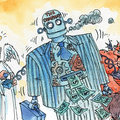| |
 | |
FOR several years, the darkest scenarios for the world economy have involved a dollar crash. The script was simple. America’s dependence on foreign capital was a dangerous vulnerability. At some point foreign investors would refuse to pile up ever more dollar assets. If investors were spooked, say by a crisis in American financial markets, they might ditch dollars fast. The greenback would plunge. A tumbling currency would prevent the Fed from cutting interest rates, deepening and spreading the economic pain.
Well, the financial shock has hit but where is the stampede out of dollars? The greenback has fallen, to be sure, particularly since it has become clear that the Federal Reserve is likely to cut interest rates on September 18th, and particularly against the yen and the euro—the dollar hit an all-time low of $1.39 per euro on Wednesday September 12th and its decline continued on Thursday.
But the decline, so far, has hardly been a panicked rout. Although the dollar has plumbed historical depths against an index of important currencies, it has fallen by less than 1.5% since the financial turmoil hit in early August. Measured against a broader group of currencies that includes all America’s main trading partners, the dollar is little changed from where it was before August’s tumult began.
As the first signs of trouble emerged, the dollar even rose. To some analysts this confirmed the dollar’s status as a haven in troubled times. More likely, it was the consequence of unwinding leveraged bets elsewhere. Whatever the reason, the dollar’s initial buoyancy did not last. In recent weeks the greenback has slowly fallen and the likely path of interest rates suggests there is more weakness to come.
Recent gloomy job statistics suggested that the economy was weakening well before the credit turmoil hit, and all but sealed the case for a cut in short-term interest rates on September 18th, certainly of a quarter point, perhaps by as much as half a percentage point. With the European Central Bank hinting strongly that euro-zone interest rates might rise again this year, it is no surprise that the dollar has hit new lows against the euro.
Its path against the yen is harder to foresee. Japan’s economy, too, seems to be in a spot of bother making it much less likely that the Bank of Japan will raise interest rates in a hurry. That suggests the carry-trade (selling borrowed yen to invest elsewhere) will remain attractive, limiting the yen’s rise.
For true dollar pessimists, these cyclical considerations are only part of the story. Far more important, they argue, is the risk that the private investors and central banks that have been funding America’s gaping current-account deficit become permanently less keen on dollar assets. Ken Rogoff, an economist at Harvard University, and a dollar bear, argues that America’s image as a great financial centre has been tarnished by the subprime mess. The “mystique” that has allowed America to borrow lavishly and cheaply has suffered a blow. The result, he argues, must be a lower dollar and higher interest rates in America relative to the rest of the world.
Indeed, the complex structured-debt products that investors now shun have been an important source of financing for America’s current-account deficit. In 2006 foreign investors, on net, bought some $400 billion of corporate-issued debt (including mortgage-backed securities not guaranteed by the government-sponsored housing giants Fannie Mae and Freddie Mac). That is the equivalent of around half the current-account deficit.
It is hard to know what share of this debt was asset-backed, let alone mortgage-backed but the numbers are big enough that foreign flight from the mortgage-backed market, if not countered by eager buying of other types of American assets, could cause trouble for the dollar.
The lesson of the past few weeks, however, is that this is unlikely to happen all of a sudden. And if private investors fret, central banks may well pick up the slack. China, in particular, has little to gain from a dollar crash. With domestic inflation now at a ten-year high, China’s politicians may be willing to let the yuan rise somewhat faster against the dollar. But they are unlikely to add to a rout, not least because that would make their exports much less competitive in America.
Another argument against a sudden crash is that the dollar is already quite cheap. In real effective terms, it has slowly fallen by some 20% since its recent peak in 2002. That decline is already helping to shrink America’s external deficit. Add in the probability of sharply slower domestic demand in America, and the current-account deficit could shrink a fair bit over the coming months. A smaller need for foreign funds would itself put a floor under the dollar. All told, the doom-mongers’ script may play out in reverse. Instead of a financial crisis prompting a dollar crash, it may accelerate the unwinding of the imbalances that had the worrywarts so unnerved in the first place.



